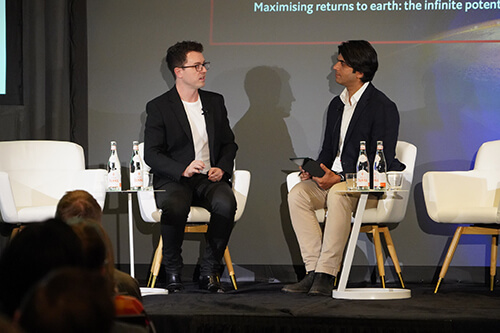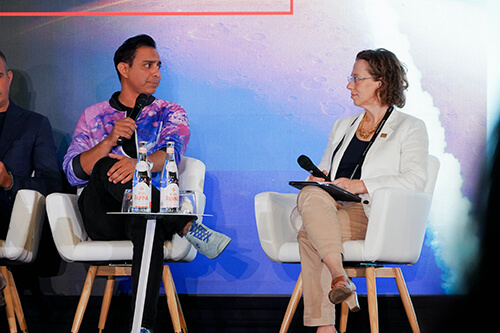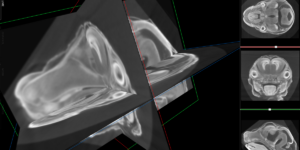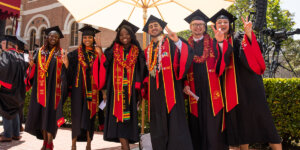
L-R: Andrew Shulkind, senior vice-president of capture and innovation at Sphere Entertainment Co; Will Porteous, partner at RRE Ventures; David Avino, founder of Argotec; Roger Rohatgi global head of design at BP; Andrea Belz, USC Viterbi vice dean of transformative initiatives
When Economist Impact, the events branch of The Economist magazine, chose to stage their first Space Economy Summit, it made sense to elect Los Angeles as the host location.
In an industry that generates close to a third of a trillion dollars globally, California accounts for 9% of the international aerospace market and 21% of the U.S. industry, according to a report produced by ATKearney (with the support of Aerospace & Defense Forum and the National Defense Industrial Association Los Angeles Chapter).
Economist Impact plans to hold an annual Space Economy Summit at different global locations each year. Establishing roots in Downtown Los Angeles, the inaugural event on October 11 set the tone with attendance by business leaders, venture capitalists, researchers and engineers.
USC Astropreneurs
It was to be expected that USC Viterbi School of Engineering would have a strong presence at the event. Andrea Belz, vice dean of transformative initiatives at Viterbi, moderated one of the most prominent panels of the day, titled “If it doesn’t make dollars, it doesn’t make sense: how can space create value for industries today and in future?”

Tim Ellis ‘(B.S. ’12, M.S. ’13), co-founder and CEO of Relativity Space, in conversation with Alok Jha, science and technology editor at The Economist
The illustrious diaspora of USC “astropreneurs” was also well represented. Tim Ellis ‘(B.S. ’12, M.S. ’13), co-founder and CEO of Relativity Space, the company that developed the world’s first 3D printed rocket, engaged in conversation with The Economist’s science and technology editor Alok Jha about the supply and demand gap of the launch market. Sierra Space, the space economy platform helmed by USC alumnus Tom Vice (B.S. ’93), was represented by Janet Kavandi, the company’s president and chief science officer, who spoke about the transition to private space stations after the International Space Station ceases operation in 2030.
Here’s a quick recap for those who aren’t already familiar with Trojan astronautics lore. Neil Armstrong received his master’s degree aerospace engineering in 1970, setting a precedent for alumni who are changing the story of humanity’s presence in space.
Counted among these are Tim Ellis and Jordan Noone (B.S. ’14), co-founders of Relativity Space, Joe Landon (M.S. ’03), CEO of Crescent Space, Joe Laurienti (B.S. ’11), founder of Ursa Major, Jeremy Allam (M.S. ’18), co-founder of Exo-Space, Laura Crabtree (B.S. ’04, M.S. ’12), co-founder of Epsilon3, and Lucy Hoag (B.S. ’07, M.S. ’09, PhD ’14), founder of Violet Labs.
That’s to name just a few of the stars in the constellation of Viterbi innovators, working in fields ranging from hardware and software development, to economic strategy and investment in the emerging era of “new space.” Viterbi is one of the few engineering schools in the nation to have a department dedicated to astronautical engineering, offering degrees at all levels, from undergraduate through to doctorate.
Opportunity and risk
The buzz at the summit was indicative of the waves of opportunity that are boosting the industry. There was a general consensus that we are already “all in” – and now the sector is growing fast.
The challenge is how to ensure sustainable growth – a guiding premise put forward by Belz as she moderated the panel of space industry heavy-hitters, including David Avino, founder of Argotec, Will Porteous, partner at RRE Ventures, Roger Rohatgi global head of design at BP, and Andrew Shulkind, senior vice-president of capture and innovation at Sphere Entertainment Co.

Andrea Belz, USC Viterbi vice dean of transformative initiatives, moderates the panel “how can space create value for industries today and in future?”
Belz started the panel by drawing attention to a game-changer for the space sector: the decline in launch costs. Panelists discussed where they saw the opportunities and attendant risks, and how the inevitable cycle of “creative destruction” might circumvent the turbulent “boom and bust” of the dot-com bubble in the early 2000s. “This is a sector that requires a lot of capital,” said Belz. “It’s not for the faint of heart.”
Addressing the question from the perspective of venture capital, advanced AI and digital transformation, and the changing context of the business environment in relation to rapid technological innovation within the space industry, the panel weighed the numbers against the human factors.
“This is such a rich and interdisciplinary sector, with opportunities driven by the collective imagination,” said Belz. “There will be significant challenges regarding reliability and sustainability. Taking full advantage of new opportunities will require building robust systems.”
Investing in the Future
Belz’s comment pointed to a theme that underpinned the summit: technologies for the space sector have both public and private applications, enabled by the tremendous decline in launch costs over the last decade. The industry is rapidly uncovering new business models for civil and commercial use. The interplay between governments and companies in the uses of space resources will drive the sector’s growth.
It’s a mindset that is central to the technical problem-solving cultivated at USC Department of Astronautical Engineering. “Commercial space companies already dominate activities in space, and recent entrepreneurial initiatives point to the exponential growth of the industry going forward,” said Dan Erwin, department chair of the USC Astronautical Engineering. “USC students are trained to think ethically, critically and imaginatively – and they’re bringing that way of thinking to the companies that are shaping the global space economy.”
Published on October 20th, 2023
Last updated on October 23rd, 2023











